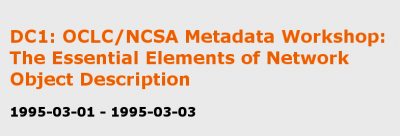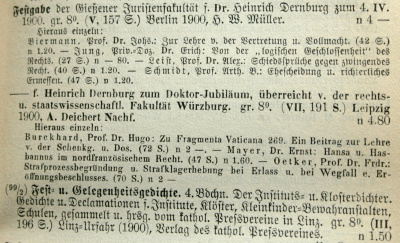Difference between revisions of "Metadata specifications in context"
From filmstandards.org
| Line 5: | Line 5: | ||
{|- | {|- | ||
| − | |||
[[File:Dc-workshop1.png|thumb|400px|left|From: http://dublincore.org/workshops/dc1/]] | [[File:Dc-workshop1.png|thumb|400px|left|From: http://dublincore.org/workshops/dc1/]] | ||
| − | |||
| | | | ||
| − | + | The concept of metadata became popular about 15 years ago when it was realised that the emerging World Wide Web with all of its digital objects would need some equivalent to catalogue records. | |
| − | The concept of metadata became popular about 15 years ago when it was realised that the emerging | ||
The ensuing development took a different course, however, with free text search engines becoming the major catalogues to the Web. | The ensuing development took a different course, however, with free text search engines becoming the major catalogues to the Web. | ||
Realising that many digital objects are non-textual and that even a text document is often a poor description of itself, the interest in metadata continued and has increased considerably over the past few years. | Realising that many digital objects are non-textual and that even a text document is often a poor description of itself, the interest in metadata continued and has increased considerably over the past few years. | ||
| + | |} | ||
| + | {|- | ||
| + | [[File:Hinrichs.jpg|thumb|400px|left|From: Hinrichs' Halbjahreskatalog, 204. Fortsetzung, erstes Halbjahr 1900, Leipzig: Hinrichs, 1900. p.215]] | ||
| + | | | ||
| + | Metadata has been produced for centuries. Usually referred to as catalogues, some collections of metadata have become huge and complex works long before the advent of computers. | ||
| + | Cataloguing rules had to reflect this complexity, leading to an ever increasing number of clauses and directives. | ||
|} | |} | ||
| + | |||
[[Category:TC 372 Compendium]] | [[Category:TC 372 Compendium]] | ||
Revision as of 08:51, 21 March 2011
From the TC 372 Workshop Compendium
Metadata, as the name implies, is data about data. In current usage of the term, the meaning of data is not restricted to digitally encoded information, but can be almost anything.
|
The concept of metadata became popular about 15 years ago when it was realised that the emerging World Wide Web with all of its digital objects would need some equivalent to catalogue records. The ensuing development took a different course, however, with free text search engines becoming the major catalogues to the Web. Realising that many digital objects are non-textual and that even a text document is often a poor description of itself, the interest in metadata continued and has increased considerably over the past few years. |
|
Metadata has been produced for centuries. Usually referred to as catalogues, some collections of metadata have become huge and complex works long before the advent of computers. Cataloguing rules had to reflect this complexity, leading to an ever increasing number of clauses and directives. |

